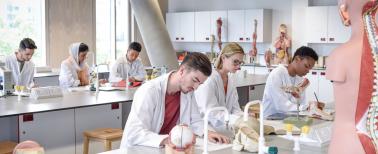Course Description
This course provides an introduction to proteins, protein structure and function, membranes, bioenergetics, and metabolism. The course is intended to provide strong preparation for health professional schools and their entrance examinations. The course is designed to impart a deep understanding of how life works at the molecular level, as well as an understanding of the methods and logic used to study and manipulate biological molecules. Throughout, we will study examples of how the principles of biochemistry serve as a foundation for basic research into how life works, as well as a foundation for understanding medicine, including the development, mechanism and specificity of drugs.
Topics
- The basic principles of molecular interactions, as well as the structure and function of biological macromolecules.
- The principles of molecular recognition and specificity that are essential for understanding how proteins and nucleic acids execute their functions within cells, and how drugs work.
- The energetics of biological reactions and the properties of biological macromolecules that enable them to catalyze chemical reactions with incredible specificity and efficiency.
- How and where the building blocks of the cell are made. We will discuss principles and energetics of metabolism, and how cells can communicate with their extracellular environment.
Expected Effort
At UC schools, 1 credit hour typically requires about 3 hours of student work per week. Actual class meeting times may vary by course.
Prerequisites / Skills Needed
Course Eligibility and Prerequisites
Prerequisites: Cell and Molecular Biology, Development and Physiology, and Organic Chemistry II (or equivalent courses).
This course is intended for postbaccalaureate students. UCSC undergraduates should follow their major’s course requirements.
This course applies to these programs:



